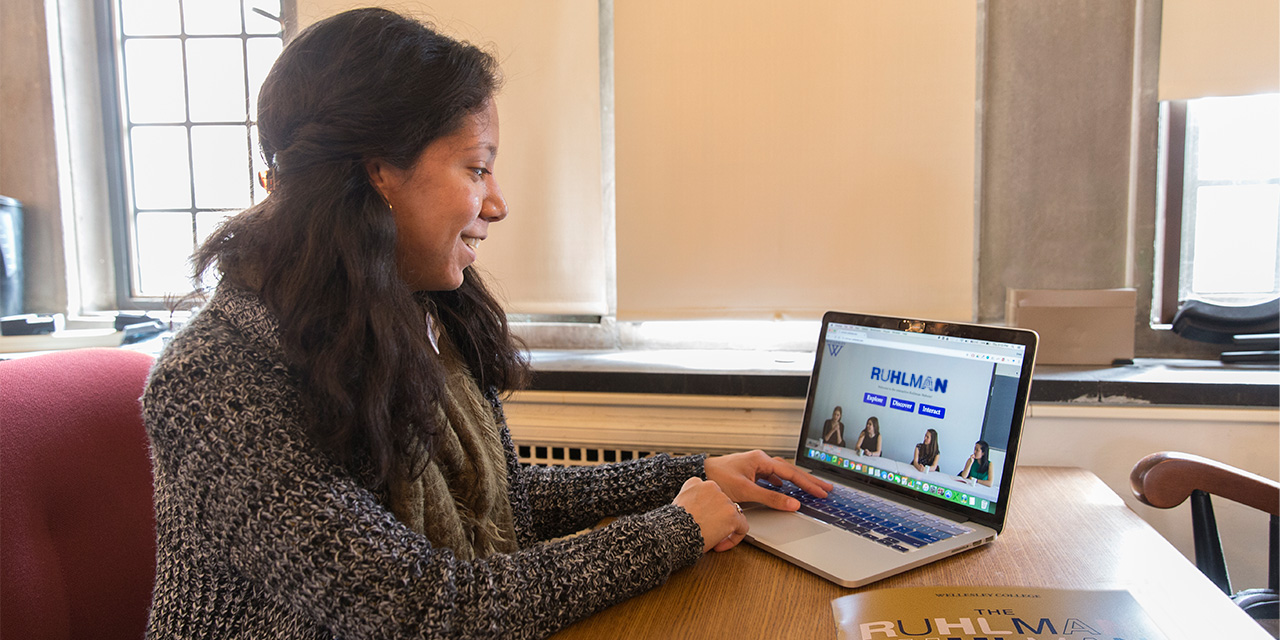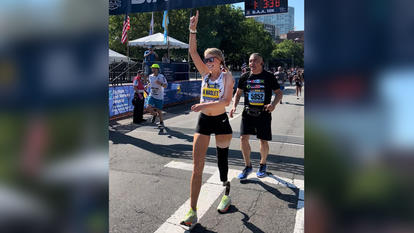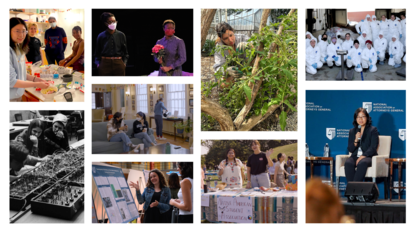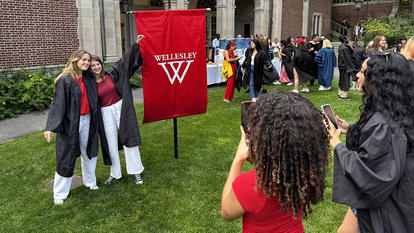Wellesley Presents the Annual Ruhlman Conference and Launches a New Ruhlman Website

Wellesley celebrates student research today with the 21st Ruhlman Conference!
The conference, named after Barbara Peterson Ruhlman ’54 and made possible by the Barbara Peterson Ruhlman Fund for Interdisciplinary Study, brings together the campus community to hear presentations on a variety of topics in the humanities, science and technology, and social sciences. The presentations represent the work of 350 students and will include panels, posters, exhibitions, musical and theatrical performances, interactive teaching presentations, and readings of original work.
As the 2017 Ruhlman catalog explains, “By providing an opportunity for public presentation of what is often a private, isolated activity, the conference demonstrates that research can be part of the ongoing conversation in a community of scholars.”
New this year is a website, created by Andrea Jackson ’18, that will enhance attendees’ understanding of that research by providing access to data collected since the inaugural conference in 1997. “Each Ruhlman conference provides insight into the research being done at Wellesley, but there was never a central location where conference data could be explored and analyzed,” Jackson said. “The interactive website allows users to do so using keyword searches.”
Possible search topics might include the number of psychology majors who have presented over the years, how many times certain topics have been presented, or a list of projects overseen by a particular professor. “In the past, users could only have found that information by looking at PDFs of all the Ruhlman catalogs and manually searching and counting. Now the site’s search page displays results from all 20 years in one place,” said Eni Mustafaraj, assistant professor of computer science, who advised Jackson throughout the project.
The website, which also generates graphs to illustrate trends over time, evolved from a presentation given at last year’s conference called “Twenty Years of Ruhlman Under the Loop of Data Science,” by Mustafaraj’s students in CS 249: Data, Analytics and Visualization, and by students of Orit Shaer, Class of 1966 Associate Professor of Computer Science and a member of the Ruhlman program committee.
The Ruhlman committee wanted to do something special with the Ruhlman data collected over the years, Mustafaraj said, and in early February 2016, Shaer and Jennie Pyers, associate professor of psychology and the faculty director of the 2016 Ruhlman Conference, contacted her about creating a project for the conference.
Initially, only four or five years of data were available, so Mustafaraj asked Pyers if her students could work with data from all 20 years. Marci Hahn-Fabris, Wellesley’s digital collections librarian, scanned the text from all of the Ruhlman catalogs into Word documents, and helped identify and fix mistakes that were introduced during that process.
In early March 2016, Mustafaraj’s 21 students—including Jackson—began converting the data into tables and ran a number of analyses based on likely questions. They shared their findings with Shaer’s Human-Computer Interaction Laboratory (HCI lab) research students, who created an interactive tabletop visualization of some of the findings mined from the data.
When the two groups gave their presentation at last year’s Ruhlman conference, the audience’s questions and comments made it clear that the entire Wellesley community would benefit from being able to access the data so that they could answer their own questions and look up different topics. A few days after the conference, Mustafaraj asked Pyers and Beth Robichaud, assistant director of academic conferences, to fund Jackson to work during the summer to create an interactive website. They agreed.

Jackson, a computer science major, learned all the web technologies needed to build a web-based system—databases and SQL, JavaScript and jQuery, and the web framework Flask—while designing the system, cleaning the data, and pulling together the data and analyses made by Mustafaraj’s CS 249 students.
“Andrea’s project sets an example for the kind of systems our students can build that enable broader accessibility to sources of information on campus, such as Wellesley’s academic history (in the form of 100 years of course catalogs); the plants, birds, and animals of Wellesley’s ecosystem; or Wellesley students’ life, as recorded in Legenda books or newspaper archives,” said Mustafaraj.
“I hope my work will inspire other students to make the College’s history easily accessible and searchable, allowing us to understand our past and plan for our future,” said Jackson, who landed an internship at Facebook this summer, in part because of the confidence and skills she developed while working on the Ruhlman website. “That’s what the Ruhlman Conference is all about.”
The conference’s schedule of events and catalog are available online and via mobile app.
Presentations by finalists for the Maurer Public Speaking Program’s third annual Jacqueline Loewe Fowler ’47 Prize in Public Speaking will be broadcast via live stream. The prize honors Fowler’s support of public speaking at Wellesley through her substantial contributions to the public speaking program established by Anne E. Maurer ’51 and her husband, Gilbert, in 2012.
This year’s Fowler Prize finalists (in schedule order) are:
Angela M. Sun ’17, “The Values of Architecture”; Amal W. Cheema ’17, “Nanomedicine: Out of the Lab and Into the Body”; Agnes (Aggie) G. Rieger ’17, “Creativity as a Route to Attitude Change: Collage-Making and the Elaboration Likelihood Model”; Lisa J. Jenkins ’17, “Let’s Talk About Sex: How Parents’ Conversations with Teens About Sex Change Over Time”; and Caroline R. Bechtel ’17, “Stumbling Into Progress: Military Learning in Disaster Relief Operations.”



